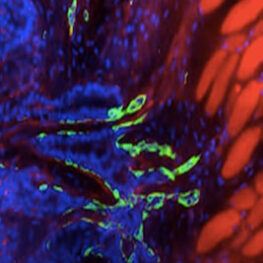With a $35 million gift from researcher, philanthropist and race car driver Theodore Giovanis, scientists
at Johns Hopkins Medicine will study the biological roots of the most fatal aspect of cancer: how it
metastasizes, or spreads, through the body.
The contribution, a 15-year commitment, will establish the Giovanis Institute for Translational Cell
Biology, dedicated to studying metastasis. The institute’s researchers aim to make discoveries that reveal
common features of metastasis across cancer types, with the potential to develop new therapies.
“Cancer is most dangerous when the disease has spread to many parts of the body, and conventional
treatments are not effective enough for patients with metastatic disease,” says the new Giovanis Institute
director, Andrew Ewald, Ph.D., the Virginia DeAcetis Professor in Basic Cancer Research and Director of
the Department of Cell Biology at the Johns Hopkins University School of Medicine. “Research in our
department has shown that many different cancers use similar molecular tools to spread, and we seek to
design treatments to disrupt this process.”
Overall, cancer is the second leading cause of death in the U.S., and some estimates indicate that about
two-thirds of cancer deaths are linked to metastasis.
“Understanding fundamental biology drives the majority of medical advances, and this gift is incredibly
important for that goal,” says Theodore DeWeese, M.D., interim dean of the medical faculty and CEO of
Johns Hopkins Medicine.
Ewald and other researchers have previously received research funding from Giovanis’ foundation, the
Jayne Koskinas Ted Giovanis Foundation for Health and Policy, named to honor his late wife, who died
from metastatic breast cancer in 2010. Giovanis is an advisory board member of the Johns Hopkins
Institute for Basic Biomedical Sciences.
“I think of myself as someone who wants to make a difference, and I can leverage the work of my
foundation to a much broader and more impactful scale by providing this gift to Johns Hopkins,” says
Giovanis.
Born in Baltimore and a Maryland resident, Giovanis’ career spans a long history in hospital system
finance and insurance regulation. He led the legal battle for hospitals for a multibillion-dollar settlement
in 2012 to correct an error in reimbursement rates for hospitals. He was among the first staff to run the
Health Services Cost Review Commission in Maryland, the only state to annually review and set Medicare and Medicaid payment rates for hospitals.
Currently, Giovanis is a professional sports car driver and owner of Team TGM in the International Motor Sports Association.
“Mr. Giovanis’ gift will enable collaboration among scientists from many disciplines, including those who
specialize in basic biology, clinical treatment of patients, physics, engineering, machine learning and
computational medicine,” says Ewald, co-leader of the Cancer Invasion and Metastasis Program at the
Johns Hopkins Kimmel Cancer Center.
The institute will be housed in the Department of Cell Biology at Johns Hopkins Medicine on the East
Baltimore campus. It will include a core group of cross-departmental scientists who focus on fundamental mechanisms of cancer metastasis, and will also award grants to fund metastasis research at Johns Hopkins more broadly.
